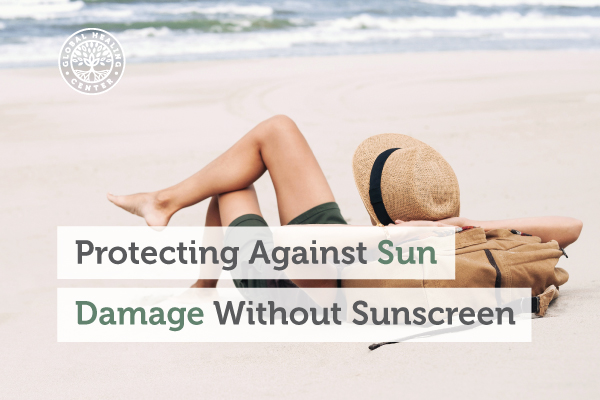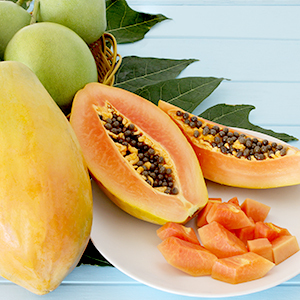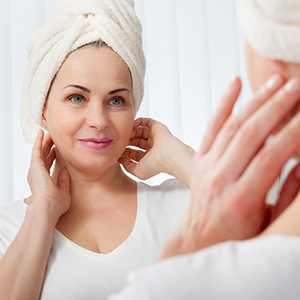
Nothing beats the feeling of pure, warm sunlight on your skin, especially after a cold and dreary winter. We often take for granted the life-giving power of the sun and completely ignore its many health benefits. On one hand, sun helps us to produce vitamin D, a hormone necessary for bone health and optimal immune function; on the other, too much sunlight can also cause deleterious effects on skin elasticity and function, aggressively facilitating the early signs of aging. Having these extreme oppositions means we need to find a balance between getting enough and avoiding damage resulting from overexposure. And, regardless of what you may have heard in the past, this doesn’t always have to require the use of sunscreen.

Natural Sunscreen Tips: Avoiding Toxic Sunscreen Ingredients
Length: 9 minutes
How to Protect Against Sun Damage from the Inside Out
The sun has been vilified for decades thanks to a number of past studies indicating sun exposure increases the risk for skin cancer. While it is certainly true that subjecting your skin to too much sunlight can elevate cancer risk, a stable approach to exposure can actually decrease mortality from all causes. [1] In response to sunlight, our body produces a hormone commonly referred to as vitamin D, creating the starting material for the initiation of a complex metabolic process that supports immune health. Sunscreen can actually decrease our body’s ability to make this incredible “vitamin.” On top of that, many of the chemicals found in conventional sunscreens can actually increase the risk for a number of diseases. [2]
Sun Protection Starts with Your Diet
Fortunately, there are effective approaches to protecting your skin against sun damage without having to entirely forgo outdoor activities. It turns out that what you put into your body may be just as important – or even more important – as the protection you place on your skin. Antioxidants are potent natural UV protectants, and specific sources of them may be helpful for protecting against accelerated skin aging due to UV exposure. [3] Here are just a few of the many ways you can protect your skin while in the sun:
Spice Up Your Routine
Exciting research delving into plant biology has discovered the synergistic protective effects of turmeric and ginger on skin health. According to recent research, both ginger and turmeric extract exhibit powerful antioxidant and soothing qualities that, when taken orally or applied topically, protect the skin matrix from both UVA and UVB rays. [4] Both extracts encourage the body’s production of Thioredoxin 1, a redox and antioxidant protein that guards against UV-generated skin damage.
Become a Tea Connoisseur
Short bouts of exposure is all that is needed for direct UV light to activate collagenase and elastase, two enzymes that catalyze the degradation of the skin’s collagen matrix. Studies have shown that white tea, one of the least processed varieties of tea picked from the Camellia sinensis plant, inhibit these two enzymes, likely protecting against early wrinkle formation. [5] In addition, white tea provides a higher degree of antioxidants than the widely-consumed black tea, providing an even greater protection from sun-induced oxidation.
Load up on Tomatoes
One of the most heavily-researched compounds in tomatoes is lycopene, and for very good reason. A number of studies point to lycopene’s ability to protect against free radicals brought on by too much sunlight exposure. [6] Organic tomato paste appears to show the highest levels of lycopene compared with raw tomatoes. Tomatoes also contain a number of other antioxidants, including a high amount of vitamin C, which acts complementary to lycopene’s protective action.
Incorporate Key Supplements into Your Daily Regimen
Supplementing a healthy diet is a great insurance plan you can take on your health. It turns out that using some key herbs and natural compounds can even be a great way to protect your skin from sun damage. Evening primrose oil contains essential fatty acids that aid skin repair, and it may also inhibit specific enzymes in the skin that break down collagen, possibly retarding wrinkle formation. [7] Vitamin C is a strong free radical scavenger that is frequently cited as a potent defender against UV damage. [8] Resveratrol is another powerful antioxidant that may inhibit DNA mutation following direct UV exposure. [9] Promising studies show pomegranate extract may protect keratinocytes from UV-induced oxidative damage and photoaging. [10] Fittingly, resveratrol is found in Ultimate Cellular Health, our most popular antioxidant proprietary blend.
Further Measures You Can Take
Some of the simplest methods for protecting against sun damage are also one of the most effective, and these include: wearing light, reflective clothing, staying in the shade after a maximum 30 minutes worth of sun exposure (depending on your skin type), wearing a hat to protect your face, and scheduling your outdoor work during the early morning or evening hours. Remember that you want to get just enough sun exposure to make vitamin D, and this will depend on your blood levels. While it’s important to expose your body to the sun, keep in mind that facial skin is typically thinner and more prone to damage, so take extra precaution to avoid direct contact. Moisturizing with olive oil, coconut oil, or rosehip seed oil at night may provide enhanced protection from the sun during the day due to their high levels of antioxidants.
References (9)
- Teresa Kulie, MD, Amy Groff, DO, Jackie Redmer, MD, MPH, Jennie Hounshell, MD and Sarina Schrager, MD, MS. "Vitamin D: An Evidence-Based Review." Journal of the American Board of Family Medicine. November-December 2009. vol. 22 no. 6 698-706. doi: 10.3122/jabfm.2009.06.090037.
- Missouri University of Science and Technology. "Sunscreen ingredient may increase skin cancer risk." Science Daily. ScienceDaily, 7 May 2012.
- Fernandez-Garcia E. "Skin protection against UV light by dietary antioxidants." Food Funct. 2014 Sep;5(9):1994-2003. doi: 10.1039/c4fo00280f.
- Thongrakard V, Ruangrungsi N, Ekkapongpisit M, Isidoro C, Tencomnao T. "Protection from UVB Toxicity in Human Keratinocytes by Thailand Native Herbs Extracts." Photochem Photobiol. 2013 Aug 12. doi: 10.1111/php.12153.
- Tamsyn SA Thring, Pauline Hill and Declan P Naughton. "Anti-collagenase, anti-elastase and anti-oxidant activities of extracts from 21 plants." BMC Complementary and Alternative Medicine 2009, 9:27. doi: 10.1186/1472-6882-9-27.
- Stahl W, Heinrich U, Wiseman S, et al. "Dietary tomato paste protects against ultraviolet light-induced erythema in humans." J Nutr. 2001 May;131(5):1449-51.
- Cho HS, Lee MH, Lee JW. "Anti-wrinkling effects of the mixture of vitamin C, vitamin E, pycnogenol and evening primrose oil, and molecular mechanisms on hairless mouse skin caused by chronic ultraviolet B irradiation." Photodermatol Photoimmunol Photomed. 2007 Oct;23(5):155-62.
- Placzek M, Gaube S, Kerkmann U, et al. "Ultraviolet B-induced DNA damage in human epidermis is modified by the antioxidants ascorbic acid and D-alpha-tocopherol." J Invest Dermatol. 2005 Feb;123(2):304-7.
- Aziz MH, Reagan-Shaw S, Wu J, Longley BJ, Ahmad N. "Chemoprevention of skin cancer by grape constituent resveratrol: relevance to human disease?" FASEB J. 2005 Jul;19(9):1193-5.
- Zaid MA, Afaq F, Syed DN, Dreher M, Mukhtar H. "Inhibition of UVB-mediated oxidative stress and markers of photoaging in immortalized HaCaT keratinocytes by pomegranate polyphenol extract POMx." Photochem Photobiol. 2007 Jul-Aug;83(4):882-8.
†Results may vary. Information and statements made are for education purposes and are not intended to replace the advice of your doctor. If you have a severe medical condition or health concern, see your physician.







